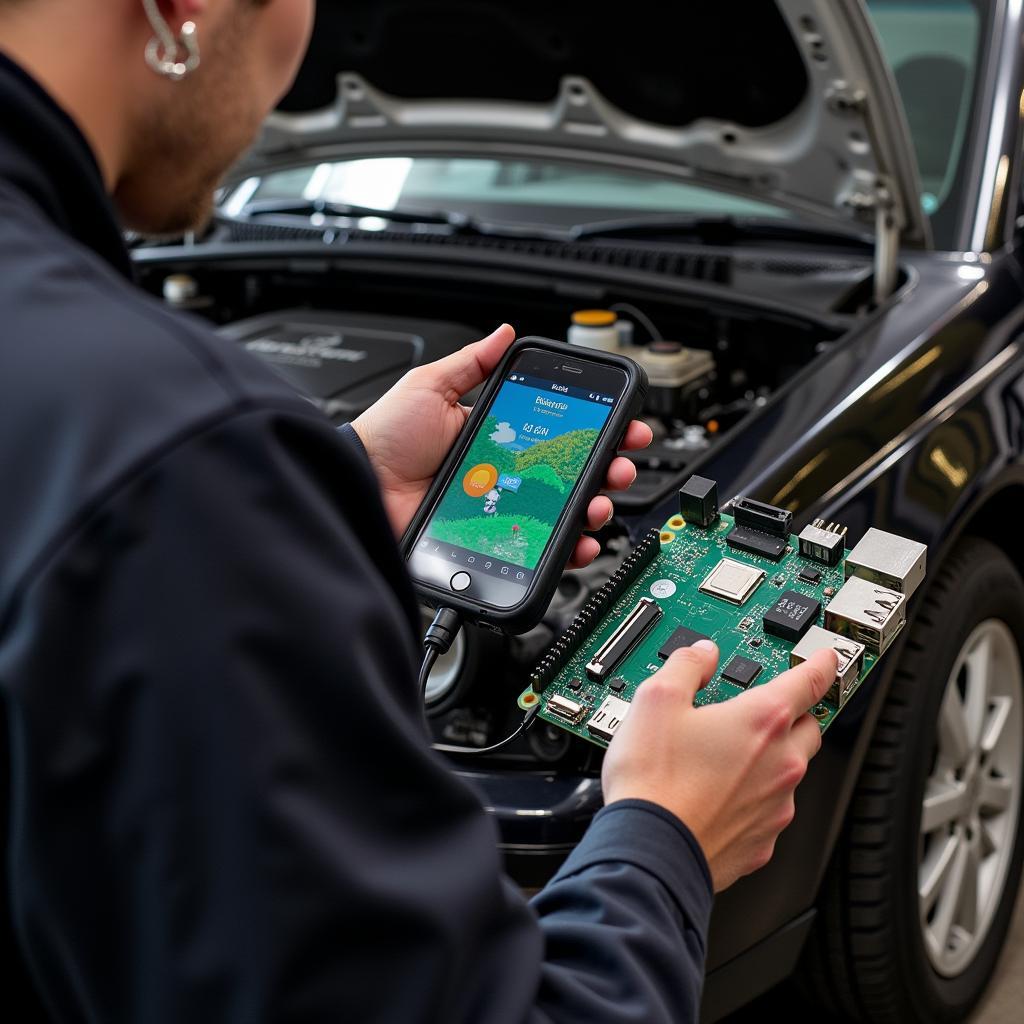The world of car diagnostics has undergone a revolution thanks to the affordable and versatile Raspberry Pi 3. No longer is in-depth car diagnostics the exclusive domain of professional mechanics with expensive equipment. With a Raspberry Pi 3, some readily available components, and a bit of know-how, you can unlock a wealth of information about your vehicle’s health, performance, and potential issues.
Why Choose Raspberry Pi 3 for Car Diagnostics?
The beauty of using a Raspberry Pi 3 for car diagnostics lies in its incredible versatility and affordability. Here’s why it stands out:
- Cost-Effective: Compared to professional-grade diagnostic tools that can cost hundreds or even thousands of dollars, a Raspberry Pi 3-based setup is remarkably budget-friendly.
- Customization: The Raspberry Pi’s open-source nature allows for incredible customization. You can tailor your diagnostic setup to your specific needs, choosing the software and interfaces that suit your skills and projects.
- DIY Friendly: Setting up a Raspberry Pi 3 for car diagnostics is a rewarding project for anyone with a basic understanding of electronics and computers.
- Powerful Capabilities: Don’t underestimate the Raspberry Pi 3. This little computer packs enough punch to run sophisticated diagnostic software, display real-time data, and even log historical information for future analysis.
Getting Started with Raspberry Pi 3 Car Diagnostics
Let’s dive into the essentials of creating your own DIY car diagnostic tool.
1. Gather Your Toolkit
- Raspberry Pi 3 (Model B or B+ recommended): The brain of your diagnostic system.
- MicroSD Card (at least 8GB): For your operating system and software.
- Power Supply: To power your Raspberry Pi.
- OBD-II Adapter: This acts as the bridge between your car and the Raspberry Pi.
- Peripherals: Monitor, keyboard, and mouse for setup and initial use.
2. Install Your Operating System
We recommend a Linux-based operating system like Raspbian, as it’s well-suited for this type of project and offers excellent community support.
3. Choose Your Diagnostic Software
Several excellent open-source and paid car diagnostic software options are compatible with Raspberry Pi 3. Popular choices include:
- Torque Pro: A user-friendly Android app that pairs well with a Raspberry Pi.
- OBD Fusion: Another robust mobile app for real-time diagnostics.
- OBDLink: Offers both software and hardware solutions for various platforms.
4. Connect and Configure
Connect your OBD-II adapter to your car’s OBD-II port (usually located under the dashboard on the driver’s side) and connect your Raspberry Pi 3 to the adapter. Follow the instructions provided with your chosen diagnostic software to configure the connection and settings.
5. Start Diagnosing!
Once everything is set up, you’re ready to read and clear trouble codes, monitor sensor data, and gain valuable insights into your car’s performance.
Taking Your Diagnostics Further
The world of Raspberry Pi 3 Car Diagnostics is brimming with possibilities. Here are some ideas to expand your setup:
- Real-Time Data Logging: Log sensor data to monitor performance trends and diagnose intermittent issues.
- Custom Dashboards: Create your own dashboards to visualize data the way you want.
- Performance Tuning: Use your diagnostic setup to monitor modifications and fine-tune your vehicle for better performance or fuel efficiency.
 Mechanic Using Raspberry Pi for Car Diagnostics
Mechanic Using Raspberry Pi for Car Diagnostics
Conclusion
Raspberry Pi 3 car diagnostics empowers car owners to demystify the inner workings of their vehicles. With an affordable investment and a bit of effort, you can access a wealth of information that can help you save money, improve your car’s performance, and become a more informed driver.
FAQs
1. Is a Raspberry Pi 3 powerful enough for car diagnostics?
Yes, a Raspberry Pi 3 is surprisingly capable of running sophisticated diagnostic software and handling real-time data from your car.
2. Do I need coding experience for this project?
While some basic coding knowledge can be helpful for customization, many user-friendly diagnostic software options require little to no coding.
3. Is it legal to use a Raspberry Pi for car diagnostics?
Yes, using a Raspberry Pi for personal car diagnostics is generally legal. However, modifying your car’s emissions system or other critical components without proper authorization might not be legal in some jurisdictions.
4. Where can I find more support and resources?
The Raspberry Pi and car enthusiast communities offer a wealth of online resources, forums, and tutorials to guide you.
5. Can I use an older Raspberry Pi model for this project?
While older models might work, a Raspberry Pi 3 (Model B or B+) is recommended for its processing power and connectivity options.
Need help?
Contact us for personalized support with your car diagnostic project. Our team of experts is available 24/7 via WhatsApp: +1(641)206-8880 or Email: [email protected].

Leave a Reply